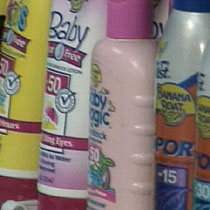2007年VOA标准英语-Study Shows Sunscreen Claims Inaccurate(在线收听)
Washington, D.C.
09 July 2007
The World Health Organization reports there are at least 130,000 new cases every year of malignant melanoma, the most fatal type of skin cancer, and more than two million cases of other types of skin cancer. Because most skin cancers are traced to too much exposure to the sun, many people have begun using sunscreen creams when they go outdoors. But do those lotions really work? VOA's Melinda Smith reports on the results of a recent study.
 |
| A beachgoer tanning in the sun |
Shopping for sunscreen lotions to block out those rays can be confusing. One claims to be waterproof -- another promises to keep on working even when perspiration washes it off.
Dermatologist Darrell Rigel of New York University's School of Medicine is skeptical about the claims. "There are lots of words on sunscreens that talk about how effective they are. But the reality is that nobody is really ensuring that those claims are accurate" he says.
 |
| Dr. Darrell Rigel |
So how do you know which sunscreen works for you? Most lotions and creams list a number for its 'Sun Protection Factor', or SPF. Usually the higher the number means greater protection.
Also, read the fine print. Look for ingredients like "mexoryl" "helioplex" , and "diethylhexol 2 , 6-napthalate."
 |
| Sunscreen lotions |
There are the major types of skin cancers -- basal cell carcinoma, squamous cell carcinoma, and melanoma, the most difficult to treat. Light skinned people with light colored eyes are more susceptible to sunburn than those with darker complexions and brown eyes. But dermatologists say skin damage can occur to anyone who stays too long in the sun.